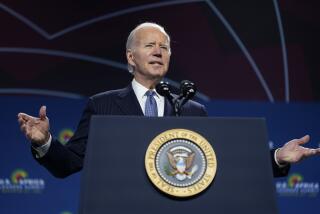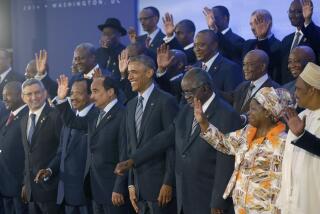Africa Acquires a New Presence in Washington
WASHINGTON â In what was nothing less than a coming-out party for a significant force in shaping Americaâs global priorities, more than 2,000 representatives from the countryâs newest lobbying group met here Thursday to approve an action plan for U.S. policy toward Africa.
The eclectic gathering, drawn heavily from the nationâs African American community and representing all 50 states and the District of Columbia, included a range of national and local politicians, bureaucrats, academics and political activists. All were seemingly united by a single overarching goal: pulling Africa from the fringes toward the center of the United Statesâ international affairs agenda.
The extent of the groupâs potential political muscle could be measured by the speakers who lined up to address its opening session--a list that included President Clinton; Secretary of State Madeleine Albright; Gayle Smith, director of African affairs at the National Security Council; and Transportation Secretary Rodney Slater.
Kenyan President Daniel Arap Moi, Nigerian Vice President Alhaji Abubakar Atiku and Salim Ahmed Salim, secretary-general of the Organization of African Unity, headed a list of African political leaders.
This first National Summit on Africa, scheduled to run through Sunday, was an impressive display of political clout. Political analysts predicted that its influence will eventually be similar to that of Americaâs Jewish community in shaping U.S. policy toward the Middle East, or of Polish Americans, whose collective clout did much to drive the North Atlantic Treaty Organizationâs enlargement.
âIn the last five to 10 years, the African American community has tried to pull together to be a serious lobby on African policy, and theyâve succeeded in large part,â said Walter Kansteiner, a specialist on Africa at the Forum for International Policy, a Washington-based think tank. âWhat weâre seeing here is proof of that success.â
Vice President Al Gore is scheduled as todayâs keynote speaker, while representatives for his Democratic opponent Bill Bradley and other presidential candidates discussed African policy at a panel session Thursday evening.
The summit is financed by grants from the Ford Foundation and the Carnegie Corp. and is the culmination of a four-year buildup that included six regional meetings and three policy conferences.
âItâs been a real spark thatâs brought a new interest in African affairs,â said John Armstead, an Environmental Protection Agency official participating in a panel discussion about the need to couple economic growth initiatives with environmental awareness.
Summit organizers said the delegates are expected to approve a plan that would serve as a de facto voice for the African American community concerning U.S. policy toward Africa in five areas: human rights, economic development, sustainable economic growth, education and security.
The recommendations would have no basis in law or formal place in the formulation of U.S. policy. But they are important because of a simple reality of the American political process: the need of elected officials to weigh the wishes of powerful interest groups.
While the impact of the new lobbying group remains uncertain, political analysts predicted that the focused interest will probably make it harder for a U.S. president or Congress to ignore crises or other significant developments in a part of the world where Western nations have traditionally been slow to react.
Organizers noted that one factor that helped galvanize interest in the summit was the sharp contrast between the Westâs intervention in Yugoslavia over âethnic cleansingâ in the Serbian province of Kosovo and its failure to react to an even more horrific slaughter in Rwanda.
Organizers said a national secretariat and state-level organizations will remain in place to lobby for the plan.
âThey will be constantly asking the administration and every member of Congress what theyâve done to implement this plan,â summit spokesman Sunni Khalid said.
Clinton, Albright and other senior members of the administration were careful Thursday to provide upbeat messages to an election-year audience.
âAfrica does matter to the United States, whatever background Americans claim,â Clinton said to enthusiastic applause. âAfricaâs future matters because the 21st century world has been transformed . . . and the central reality of our time is globalization [and] tearing down barriers between nations and peoples.â
Clinton called on Congress to resolve differences between versions of an African trade bill passed separately by the House and Senate and to send it to him for signing by next month. The bill, opposed by organized labor, would ease access for African products into U.S. markets.
More to Read
Sign up for Essential California
The most important California stories and recommendations in your inbox every morning.
You may occasionally receive promotional content from the Los Angeles Times.










